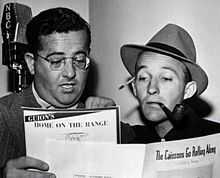John Scott Trotter
| John Scott Trotter | |
|---|---|
 John with Bing going over sheet music | |
| Background information | |
| Born |
June 14, 1908 Charlotte, North Carolina, U.S. |
| Died |
October 29, 1975 (aged 67) Los Angeles, California, U.S. |
| Genres | Classical music, big band |
| Occupation(s) | Arranger, composer, orchestra leader |
| Years active | 1925-1978 |
| Associated acts | Hal Kemp, Bing Crosby, Jimmy Dorsey, Spike Jones, George Gobel |
John Scott Trotter (June 14, 1908–October 29, 1975),[1] also known as Uncle John[2] was an American arranger, composer and orchestra leader.
Trotter was best known for conducting The John Scott Trotter Orchestra. He was also known for being the orchestra conductor for singer and entertainer Bing Crosby and several of his radio programs in the 1930s and 1940s.[3]
Early life
Trotter was born John Scott Trotter, Jr. on June 14, 1908 in Charlotte, North Carolina. He was born to parents John Scott (June 26, 1881–August 8, 1949) and Lelia Trotter (née Bias) (May 10, 1885–July 7, 1965).[4][5]
Trotter attended local schools in Charlotte. He also studied piano under Ida Moore Alexander. In 1922, Trotter entered the University of North Carolina. It was there where in 1925, Trotter began his career as a professional musician playing the piano for a college band led by Hal Kemp. She graduated from the university in 1926. He remained with Kemp's band until 1936.[6]
Career
After leaving Kemp's band, Trotter began working for Paramount Pictures where he and his newly formed eponymous orchestra handled the music for the studio's Pennies from Heaven which was his first association with Bing Crosby.[5] Trotter and Crosby first met in 1930 in New York City at the Manger Hotel while Crosby was working with Paul Whiteman's orchestra.[6] This would start a 17 year association with Crosby.
The next year in the July of 1937, Trotter replaced Jimmy Dorsey as the musical director for Crosby on NBC's radio program Kraft Music Hall. That same year, Trotter began arranging and conducting songs for Crosby's records for Decca. Two memorable records came from that association; It's the Natural Thing to Do and Smarty, both recorded in 1937.[7] Trotter would remain Crosby's musical director until 1954.
Trotter also had orchestra related responsibilities. Jerry Colonna was a trombonist for the band and future entertainer Spike Jones served as a drummer.
Trotter moved on to television, becoming musical director for The George Gobel Show from 1954-60. He served as musical director of several of Crosby's television specials as well as his 1964-65 ABC situation comedy, The Bing Crosby Show. Later he directed the music for the Charlie Brown cartoon specials. In 1970, Trotter was nominated for an Oscar award and a Grammy award for his musical score for the movie A Boy Named Charlie Brown.[6]
Death
Trotter died of cancer at Cedars-Sinai Medical Center in Los Angeles, California. He was buried in Sharon Memorial Park in Charlotte. Surviving him were a sister, Margaret Kinghorn, and two brothers, William and Robert Trotter.[5]
Legacy and criticism
Carroll Carroll, who was the chief writer of Kraft Music Hall, recalled Trotter massive volume and appetite when it came to his everyday life;
| “ | Trotter, a monolith of a man, stood astride pop and 'long hair' music, as it was then called, like a colossus, and occasionally flew from Hollywood to New Orleans for the weekend (something not done often in the thirties) just to cater to his gourmet tastes with a decent plate of oysters Rockefeller. During the war, when home economist M.F.K. Fisher was a guest on the show to plug her wartime conservation cookbook, How to Cook a Wolf, she told Bing that her book explained how to use leftovers. The heartily-fed Trotter stepped to the mike and, in his most polite and gentle North Carolina drawl, asked, 'Pardon me, ma'am, but what are left-overs?[8] | ” |
Trotter, along with Jack Kapp, has been criticized for mainstreaming Crosby's style away from his jazz roots. The reality is that Crosby chose the songs he sung on his radio shows and had ultimate approval for anything he recorded to disc. He could've worked with any musical arranger he chose, but he chose Trotter for 17 years. Crosby once said of Trotter;
| “ | I'm not musically educated enough to really describe what he was in music terms. I just knew he was very good and he had marvellous taste. | ” |
References
- ↑ "John Scott Trotter". www.rusc.com. Retrieved March 17, 2015.
- ↑ John Scott Trotter at the Internet Movie Database
- ↑ "Speaking of radio interview with John Scott Trotter". www.speakingofradio.com. Retrieved March 17, 2015.
- ↑ John Scott Trotter at Find a Grave
- ↑ 5.0 5.1 5.2 "Trotter, John Scott 14 June 1908-29 Oct. 1975". ncpedia.org. Retrieved March 17, 2015.
- ↑ 6.0 6.1 6.2 "John Scott Trotter". Steven Lewis. Retrieved March 17, 2015.
- ↑ "Andy Secrest Centenary". www.virtualvictrola.com. Retrieved March 19, 2015.
- ↑ Sennett, Ted (January 1, 1976). The Old Time Radio Book. Pyramid Books. p. 70. ISBN 9780515040678.